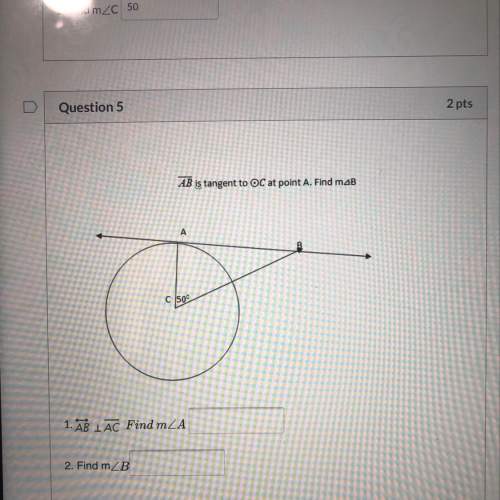
Mathematics, 14.09.2019 03:30 ajayrose
Which of the following statements do not necessarily imply that (an) is divergent? (a) (an) is eventually positive and (1/an) is null (b) (an) is unbounded (c) (an) has two convergent subsequences whose limits are not equal (d) (an) has both an increasing subsequence and a decreasing subsequence (e) all statements imply that (an) is divergent

Answers: 1


Another question on Mathematics

Mathematics, 21.06.2019 19:30
Consider that lines b and c are parallel. what is the value of x? what is the measure of the smaller angle?
Answers: 1

Mathematics, 21.06.2019 22:30
What is the common difference for this arithmetic sequence? -6,-2,2,6,10 a.4 b.5 c.3 d.6
Answers: 1

Mathematics, 22.06.2019 00:00
Iwill arward ! , i if bt ≅ eu , bu ≅ et , prove: ∠b ≅ ∠e. fill in the blanks: draw segment ut ≅ bt≅ bu ≅ △ubt ≅ △
Answers: 1

Mathematics, 22.06.2019 00:40
Calculate the effective quarterly compound interest rate equivalent to a 1% of monthly compound interest rate.
Answers: 3
You know the right answer?
Which of the following statements do not necessarily imply that (an) is divergent? (a) (an) is even...
Questions


Mathematics, 14.12.2019 01:31

Mathematics, 14.12.2019 01:31


Health, 14.12.2019 01:31

Mathematics, 14.12.2019 01:31


Mathematics, 14.12.2019 01:31

Chemistry, 14.12.2019 01:31

Mathematics, 14.12.2019 01:31

Mathematics, 14.12.2019 01:31

Mathematics, 14.12.2019 01:31

Mathematics, 14.12.2019 01:31

Mathematics, 14.12.2019 01:31




History, 14.12.2019 01:31


English, 14.12.2019 01:31

 has both an increasing subsequence and a decreasing subsequence" does not necessarily implies that the sequence is divergent. For example, let
has both an increasing subsequence and a decreasing subsequence" does not necessarily implies that the sequence is divergent. For example, let  if n is odd
if n is odd if n is even
if n is even is a decreasing sequence (the subsequence given by odd indexes). And the subsequence
is a decreasing sequence (the subsequence given by odd indexes). And the subsequence  is an increasing sequence (the subsequence given by even indexes).
is an increasing sequence (the subsequence given by even indexes).


